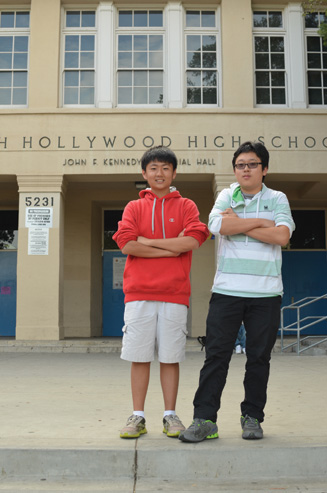Issac Kim (with glasses) and Isaac Kim, in front of North Hollywood High School, where they are part of the cyber defense team, Azure.
The Defenders
Two Korean American teens are part of a Southern California high school team advancing to the finals of an elite national cyber defense competition.
by RUTH KIM
Meet Isaac Kim and Issac Kim. No, that wasn’t a typo. These two unrelated Korean American juniors at North Hollywood High School just happen to share nearly identical names and are part of an elite five-member team competing in the finals for CyberPatriot, a national high school cyber defense competition. What are the chances of that happening? Well, that’s probably a question better directed at these brainiacs, who one day just might be defending this country against the threat of cyber attacks.
When this reporter paid Isaac and Issac a visit last month at their school, located in the San Fernando Valley of Southern California, one was scarfing down a burger and the other Pad Thai noodles, while sitting in front of their laptop screens at an after-school practice session. In just a few weeks, their North Hollywood High team, Azure, would be among only 10 competitors from North America advancing to the CyberPatriot finals in Washington, D.C., from March 25 to 29.
[ad#336]
Isaac, Issac and their teammates take the competition very seriously, and have been practicing for a few hours after school every day in a small but homey classroom that’s decorated with CyberPatriot posters and banners. On a couple of nearby desks, the students’ sharp navy blue blazers for the competition are laid out. The youth spend most practice sessions with their coach Jay Gehringer, tackling daily assignments in a casual discussion-like manner, though on some days, the team also has visits from—or conference calls with— mentors from Cisco and Microsoft, who also help prepare them.
“Cyber security is, basically, like, these days, you know, there’s a lot of news of hackers getting access to computers and stuff,” describes Issac, 17, born and raised in Southern California. “So the idea of cyber security is, you want to prevent these kinds of attacks. And cyber security is basically, you have a computer, and you need to secure it in order to keep out attackers, which includes methods like anti-viruses, making sure that you don’t have any issues on the computer. You’re securing it to make sure no remote connections can be made and stuff like that.”
“I see it as like a new war in this world,” explains Isaac, 16, who was born in Korea and immigrated to the U.S. at age 8. “Before, you needed men and soldiers and weapons to attack people and conquer nations. But now it’s all done digitally. Many nations hack each other to get crucial information, and now there’s drones and things like that, so I see it as a really important thing for the future right now.”
[ad#336]
The Air Force Association created CyberPatriot five years ago to excite high school students about science, technology, engineering and math education, often referred to by the acronym STEM. General Bernard Skoch, the national commissioner of CyberPatriot and a proud Air Force veteran, says members of his organization were increasingly concerned about the nation’s general lack of interest and accomplishment in STEM education, describing it as “a national security issue.”
“We just aren’t bringing enough young men and young women into technical fields to support the national workforce in technical fields,” he says. “So we, as an association, set out to do something.”
What began as a modest pilot program with eight Florida-based teams in 2009 has grown to 1,500 teams in all 50 states and Canada. The opportunity for scholarships through the program also serves as an incentive for students to participate. “We’ve given out $158,000 in scholarships in the past three years, and we’ll reward another $60,000 or so in our national finals next week,” says Skoch. The event also has drawn big-name sponsors, like Northrop Grumman, and there has been about a 30 percent growth in student participation over the years, he says.
Both Isaac and Issac credit their coach for sparking their interest in joining their cyber security team, a tightknit, all-male group that likes to laugh at inside jokes—like the one involving a kernel panic from the Linux operating system. (It’s apparently very funny.)
Each member of Azure has a particular expertise. Isaac, wearing a red hoodie and big smile, is more focused on Windows—“I usually take over, like, a server or workstation,” he says. Meanwhile, Issac, who wears glasses and has a quiet demeanor, says he’s more of an all-around person who can do everything—“well, except for research.” A type of problem that the cyber competition might present is to give the kids a computer with an automatic login, and the students earn points for making it more secure.
[ad#336]
In case you’re wondering how the team deals with getting Isaac versus Issac’s attention, the latter explains: “Because my spelling’s technically wrong, we refer to me as ‘Izzick,’ and the other Isaac is sometimes just Isaac, or Gehringer likes to call him ‘Eezack.’”
Gehringer also likes to call both students intelligent and hardworking. “These young men have bright futures ahead of them,” says the proud coach.
Though Azure requires a great deal of extra work, the high school juniors say they have enjoyed preparing for CyberPatriot, especially since the Azure team members are close friends and the prospect of actually winning it is so close at hand. They only made it to the semifinals last year.
Isaac can still taste the victory from this year’s semifinals, as he describes the climactic last moments of the competition. “We knew that we were really high up in the ranks, [but] we were still looking for things to get more points. We were talking about something, and there was a really minor detail that we usually forget and we just skip over, and when we just decided to focus on that for the last 10 minutes of the competition and we got points for it, we were very happy,” Isaac says enthusiastically.
“But because we got into finals this time, I feel like we just went over another wall,” he adds. “And now we just have so much more of a chance.”
Epilogue: After a daylong competition on March 28 in Washington, D.C., the winners of the CyberPatriot competition were announced: Isaac and Issac’s team, Azure from North Hollywood High School, took the title as national champions. Each member of the winning team was awarded $2,000. The students are being treated to a heroes’ homecoming rally at their school today.
Below is a picture of the winning team, with coaches, along with Kathy Warden, corporate vice president and president of Norththrop Grumman Information Systems (center), Air Force Association chairman of the board George Muellner (far left) and CyberPatriot commissioner Bernie Skoch (far right). (Photo by Rich Frasier)
This article was published in the April 2014 issue of KoreAm. Subscribe today! To purchase a single issue copy of the April issue, click the “Buy Now” button below. (U.S. customers only. Expect delivery in 5-7 business days).








